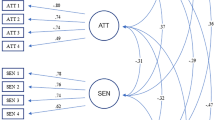Abstract
This research investigated the relationship between children's temperamental characteristics and adult behavior. Children were selected for four sex-by-temperament groups on the basis of parent report of temperament and were observed interacting with either a highly controlling or a very permissive adult. The results indicated that the degree of adult control or demands is an important component in understanding the “goodness of fit” between parent behavior and child characteristics and that a child's temperament and its relationship to adult behavior cannot be considered in isolation from other child characteristics, particularly the child's sex. Children's sex and temperament were found to interact in relationship with adult controlling behavior while no child behaviors varied as a function of sex or temperament alone. Adults were found to adjust their controlling behavior as a function of the child's sex and temperament. The results are discussed in light of the cross-sex effects of social reinforcement.
Similar content being viewed by others
References
Buss AH, Plomin R:A temperament theory of personality development. New York: John Wiley & Sons, 1975.
Thomas A, Chess S:Temperament and development. New York: Brunner/Mazel. 1977.
Cameron JR: Parental treatment, children's temperament and the risk of childhood behavior problems: 2 Initial temperament, parental attitudes, and the incidence and form of behavioral problems.Amer J Orthopsychiat 48:140–147, 1978.
Graham P, Rutter M, & George S: Temperamental characteristics as predictors of behavior disorders in children.Am J Orthopsychiat 43:328–339, 1973.
Scholom A, Zucker RA, Stollack GE: Relating early child adjustment to infant and parent temperament.J Abnorm Child Psychol 7:297–308, 1979.
Thomas A, Chess S, Birch HG:Temperament and behavior disorders in children. New York: New York University Press, 1968.
Cameron JR: Parental treatment, children's temperament, and the risk of childhood behavioral problems: 1. Relationships between parental characteristics and changes in children's temperament over time.Amer J Orthopsychiat 47:568–576, 1977.
Campbell SBG: Mother-infant interaction as a function of maternal ratings of temperament.Child Psychiatry Hum Dev 10:67–76, 1979.
Milliones J: Relationship between perceived child temperament and maternal behaviors.Child Dev 49:1255–1257, 1978.
Martin B: Parent-child relations. In Horowitz FD (Ed),Review of child development research, Volume 4. Chicago: University of Chicago Press, 1975.
Hollingshead AB: Two factor index of social position. Unpublished manuscript, 1957.
Kogan KL, Gordon BN: Interpersonal behavior constructs: A revised approach to defining dyadic interaction styles.Psychol Repts 36:835–846, 1975.
Horowitz FD: Social reinforcement effects on child behavior. In Hartup W&Smothergill N (Eds),The young child: Reviews of research, Volume 1. Washington, DC: National Association for the Education of Young Children, 1967.
Bell RQ: Contributions of human infants to caregiving and social interaction. In M Lewis, LA Rosenblum (Eds),The effect of the infant on its caregiver. New York: John Wiley & Sons, 1974.
Korner AF: Mother-child interaction: One-or two-way street?Social Work 10:47–51, 1965.
Author information
Authors and Affiliations
Additional information
This study is based on a doctoral dissertation submitted by the author to the University of Washington. The author gratefully acknowledges Carolyn Schroeder for her critical reading of the manuscript.
Rights and permissions
About this article
Cite this article
Gordon, B.N. Child temperament and adult behavior: An exploration of “goodness of fit”. Child Psych Hum Dev 11, 167–178 (1981). https://doi.org/10.1007/BF00709381
Issue Date:
DOI: https://doi.org/10.1007/BF00709381




